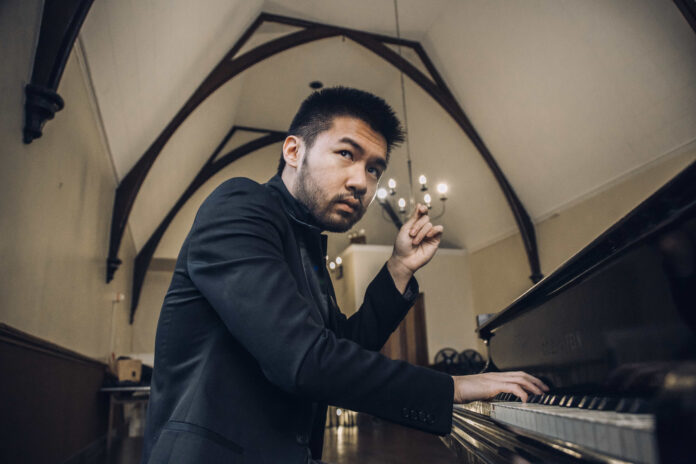Conrad Tao is always doing something. A couple years ago, I was blown away by the New York City pianist’s curated program at SF Symphony’s experimental sensation Soundbox. Intense on the keys, the young player’s adventurousness in his music was almost scandalous. (We ended up raving all night together at F8 afterwards, during which I might have been a bit gushy.) Seeing him recently on NPR’s Tiny Desk busting the ivories with tap dancer Caleb Teicher was a real treat, and I’m still kicking myself for missing his Cal Performances recital last year, which included inspiration from avant-garde poetry.
Now he’s back with another innovative program at San Francisco Performances (Fri/17, 7:30pm, Herbst Theatre, SF): tracing composer Sergei Rachmaninoff’s influence on classic pop of the 20th century. Rachmaninoff themes pop up in surprising places, from compositions by Billy Strayhorn, Stephen Sondheim, and Harold Arlen through renditions by Frank Sinatra, Bob Dylan, and Celine Dion. (Sorry, despite her tortured poet affectation, no Taylor Swift… yet.) He’s pairing Rach and pop, and we are here for it. I spoke with him over Zoom in preparation for his performance.
48 HILLS What sparked this idea of tracing Rachmaninoff’s influence through classic 20th century pop? It’s one of those things that, once you hear it, it’s very hard to unhear.
CONRAD TAO I was being asked if I had any sort of Rachmaninoff-centered program that we could present in 2023, which was the big 150th anniversary of his birth. I said to my manager, I’m not sure if this is right for me—I love Rachmaninoff, but I haven’t really played much of his solo piano music. I wanted to do something different if I was going to put something together.
It just so happened that around that time I saw Brief Encounter for the first time, the David Lean movie. The only music in the movie is from Rach 2 [Piano Concerto No. 2]. It’s used so beautifully—it’s not diagetic, and it’s not merely underscoring. It’s a kind of formal element that brings you into the protagonist’s head. I was just so moved by it, I could watch that movie over and over again. So I was open to the kind of longing and romance of Rachmaninoff, but also the straightforward, melodic beauty of his music.
I started thinking around that cluster of feelings, and also how there’s this legacy of pop composers pilfering Rachmaninoff melodies for their own purposes. “Full Moon and Empty Arms,” which was recorded by Sinatra and Bob Dylan and many other people, takes its melody from the second theme of the last movement of Rach 2. Then there is, maybe most fabulously, “All By Myself” by Eric Carman, famously recorded by one Celine Dion—that takes the Rach 2 second movement as the source material for the verses.
I also started thinking about the fact that Rachmaninoff came to New York in 1918, and died an American citizen. I have observed over the years that there is definite jazz influence on Rachmaninoff’s later works. All of these things started coming together and that’s when I realized, like, oh, I think I can make something of this, I can speculate in this program about the influence of American jazz and popular music on Rachmaninoff, and also Rachmaninoff’s influence on American popular music as well.
48 HILLS I honestly did not know there were so many connections. One of the things I find fascinating about this program is, growing up we’re taught that classical music is such its own monumentality—it feels like its always in its own bubble, hundreds of years away from the present. But some of the stuff you’ve been playing in the program, like “Take the ‘A’ Train” by Billy Strayhorn, were composed within a decade of his death! Rachmaninoff was happening during Gershwin and Tin Pan Alley and the blues, not Beethoven. It’s like some atemporal illusion, the classical vortex.
CONRAD TAO I think my role in putting this program together is to illuminate those connections, and I was just delighted that the whole thing works. At first I was a bit nervous from a purely programming standpoint, because here’s not a ton of music that Rachmaninoff actually wrote after he came to the US. But what he did write is substantial. We have the Rhapsody on a Theme of Paganini, and the Symphonic Dances, which closes out the program, and is, in a way, a piece that’s very nostalgic for an old Russia that he had left and that didn’t exist anymore, as well as his integration of all of these new things that he learned in the States.
But to fill a whole solo piano program, I did need to take from works before he moved here. That actually ended up being really fun and gratifying, because it showed that he was already on this kind of tip. He was already writing music that would be influential in the States. The reality is that American popular music comes from Black American lineage of blues and jazz, and it was also hugely affected by all the waves of European emigres that came here in the early 20th century. Take something like “‘A’ Train”—Strayhorn’s music is sort of a thread that runs throughout the program. Strayhorn loved classical music, and was versed in it, and really was passionate about it. There was a real intersection there. One nice surprise was that at the end of all my research, I felt still convinced by my own thesis. [Laughs].
48 HILLS What about technique when it comes to playing both Rachmaninoff and pop? I think a lot of people associate Rachmaninoff with fireworks and performers can really splash out with him. But the power and timelessness of most classic pop songs is rooted in their simplicity…
CONRAD TAO Ooh, I love that question. It’s true, the reputation that Rachmaninoff has, it has to do with the surface of his music. There’s a lot of notes, the page looks kind of scary and dense. Yet I feel happiest when I’m playing his work when I’m not playing those surface notes, when this surface notes are actually more of an outgrowth or natural manifestation of what I’m playing, almost like they’re being generated by his chord structure or deep melody.
It’s similar to when you’re reading a chart for a jazz standard: Maybe you get the melody, and you get your chord structure, but then you’re expected to elaborate on it, and there’s all that room for spontaneity. So I often think of Rachmaninoff’s sort of dense, glittery surface as being noted out, almost an improvisation. Of course, being from a noted tradition, that can be so precise and beautiful and satisfying. But that in a way, it’s not that different, actually. There are all of these beautiful textures on top, tracing out these intricate chords. Like I said, I’m happiest when I’m not thinking about each individual millisecond note, but the melody they’re wrapping around.
SAN FRANCISCO PERFORMANCES: CONRAD TAO Fri/17, 7:30pm, Herbst Theatre, SF. More info here.






